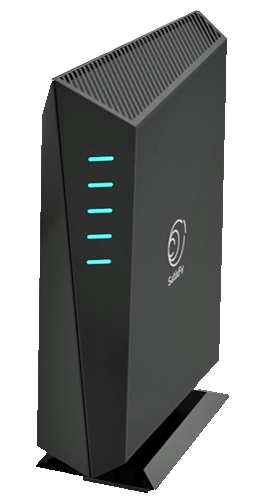
SatixFy has introduced their first Wideband 500 MHz DVB-S2X Software Defined Radio (SDR) modem.
SatixFy is demonstrating operation of this modem, based on the company's SX-3000 chip, at Satellite 2018 in their booth (#649) in Washington, D.C. The product sets a record in terms of throughput, demonstrating 2.4 Gbps in 64 APSK with no time slicing or 256 APSK with 30 percent time slicing. According to the company, the new Wideband SDR modem is the only one in the market today supporting Beam Hopping and VLSNR.

SatixFy's SDR Modem.
The new modem's single carrier and Beam Hopping architecture enables substantially higher throughput from wideband (500 MHz) satellite transponders to enable superior connectivity. With SatixFy's modem, through single 500 MHz carrier and Beam Hopping capability, satellite operators and service providers will be able to get significantly higher throughput for applications requiring it, such as trunking, enterprise, and backhauling. A 1U rack mount Enterprise model is available today and a Consumer Unit will be available in Q4 2018.
The Wideband SDR modem demonstration using the R&S®SMW200A vector signal generator from Rohde & Schwarz shows no errors at -2 dB SNR with DVB-S2 QPSK rate ¼. The R&S®SMW200A single-instrument solution simplifies the testing of components, modem devices and satellite payloads. The vector signal generator supports DVB-S2/DVB-S2X and the latest satellite standard of a mega constellation. It is the first fully calibrated wideband solution with an RF modulation bandwidth of 2 GHz on the market and generates signals across all frequencies and satellite bands up to 40 GHz in the Ka-band.
Another demonstration is based on TeamCast TYGER, a wideband, DVB-S2/S2X compliant modulator offering high rates (up to 480 Mbaud, i.e., up to 2 Gbps), Time Slicing (Annex M), CID management and GSE IP encapsulation for maximizing, payload, operational flexibility, and return on investment. For IP transport, the use of the GSE adaptation algorithm insures lower overhead and maximized capacity and spectrum efficiency. By meeting the requirements of the DVB “Annex M,” TYGER enables the mixing of services (broadcast and broadband) over the same satellite carrier. Specifically, it supports Time-Slicing, a process to split a wideband signal — up to 2 Gbps — into a number of independent low rates services, to keep the receiver IC complexity and price low, which is a mandatory requirement for a mass market adoption.
At Satellite 2018, SatixFy will also be demonstrating its Beam Hopping Emulator. The company, alongside its partners, is leading the industry in developing and setting standardization efforts for super-frame structure and beam hopping waveforms in DVB, and Resource Management, as well as Beam Hopping Illumination Plan algorithms and configurations in ETSI.
Yoel Gat, the SatixFy CEO, said that the company is pleased to introduce their first Wideband modem and demonstrate the unbeatable performance of the SX-3000 chip in terms of QEF performance with a fraction of dB from DVB-S2X guidelines with over 2 Gbps throughput per 500 MHz transponder. The SatixFy team is the first in reaching industry leading benchmarks that, until now, were out of the industry's grasps. This modem demonstrates the company's advantages over the competition. It is the only one in the market that supports Beam Hopping and VLSNR and is the only SoC that supports the demodulator, modulator, dual core host CPU and 3 DSPs, with periphery of three 1 GB Ethernet ports, UART and many peripheral interfaces," said .

